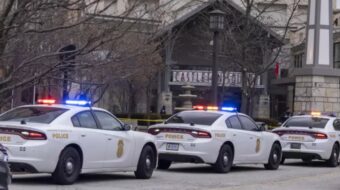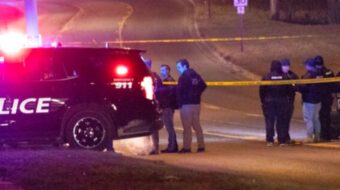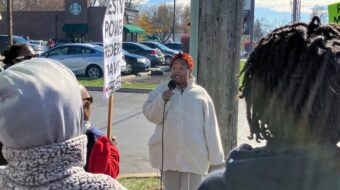
As the California legislature faces an end-of-the-month deadline before sending bills it passes to Gov. Jerry Brown for signature, among measures still to be decided are two designed to address repeated instances of police misconduct that have cost or devastated the lives of countless mostly black and brown Californians over the years.
One, Assembly Bill 931, The Police Accountability and Community Protection Act, by Assembly Members Shirley Weber, D-San Diego and Kevin McCarty, D-Sacramento, would tighten the current standard for when police can shoot someone they are trying to arrest.
The other, Senate Bill 1421, Peace Officers: Release of Records, by state Senator Nancy Skinner, D-Berkeley, would open police disciplinary records to the public if a police officer is found to have committed sexual assault, or lied by filing false reports or planting evidence.
Both were introduced during widespread protests following the killing of an unarmed African American, Stephon Clark, by Sacramento police in March of this year.
Among many organizations backing both: the American Civil Liberties Union of California, Anti Police Terror Project, Black Lives Matter, Communities United for Restorative Youth Justice, PolicyLink and the Youth Justice Coalition.
AB 931 would require that police officers try to de-escalate a situation where possible and would let officers use deadly force only when necessary to prevent imminent serious bodily injury or death to a police officer, even if a suspect is fleeing arrest. It also lets prosecutors consider what actions officers may have taken before a killing, that could have increased their risk of being harmed.
Currently, under state law and court rulings, officers may use “reasonable force” when making an arrest. And following a 1989 U.S. Supreme Court ruling, they may use deadly force when an “objectively reasonable” officer would do so under similar circumstances.
“We have been deeply saddened and frustrated by the killing of black and brown men of our community. It seems that the worst possible outcome is the only outcome that we experience,” Weber told an April press conference. “But the public activism in the last few weeks, and their energy, has truly been inspiring. It is time now that we as legislators match that energy and do the right thing by pushing for smart and effective reform.”
AB 931 has been sharply debated, with civil justice organizations giving their strong support, and law enforcement groups adamantly opposed.
The bill is now before the state Senate’s Rules Committee before heading to a vote by the full Senate.
SB 1421 would require law enforcement agencies to provide public access to records related to discharge of a firearm, use of force resulting in death or serious bodily injury, on-the-job sexual assault, and dishonesty in reporting, investigating or prosecuting a crime.
Skinner has called California “an outlier when it comes to providing public access to law enforcement records,” noting that the state ‘s “existing confidentiality rules on law enforcement records … are among the most secretive in the country.”
In an interview with the San Francisco Chronicle last week, Natasha Minsker, director of the ACLU’s Center for Advocacy and Policy, called the state “one of the most secretive when it comes to police records,” with only New York and Delaware having similar bans on the public and prosecutors gaining information on proven cases of police misconduct.
Minsker added that even with SB 1421’s passage, California would still be “near the bottom of the list” in terms of secrecy: “That speaks to how far California is behind on this issue.”
Passed last week by the Assembly’s Appropriations Committee, SB 1421 now awaits a vote by the full Assembly. It, too, faces opposition from police officers’ associations.
Another measure, Senate Bill 10, the California Bail Reform Act, introduced last year by Sen. Bob Hertzberg, D-Los Angeles, passed the Assembly, 41-27 on Aug. 20. But it lost the support of key civil rights organizations when it was amended after negotiations with Gov. Brown and with the state Judicial Council, which sets policy for the state’s court system. The measure will now go back to the Senate one last time before it can be sent to the governor for signature.
SB 10 would replace the current system under which counties decide their own bail schedule and many people who can’t afford bail remain incarcerated for long periods, with a system of standardized “risk assessment tools” intended to let low risk defendants stay out of jail before their trials.
“Low risk” people would be released pending a hearing, while pretrial services offices would decide about those with “medium risk.” Judges would have greater powers to decide whether “preventive detention” is justified.
The ACLU – at first supportive – now opposes the bill.
In a joint statement, executive directors of the ACLU’s three California affiliates – Abdi Soltani of Northern California, Hector Villagra of Southern California and Norma Chavez Peterson of San Diego and Imperial Counties – said SB 10 in its present form “is not the model for pretrial justice and racial equity that the ACLU of California envisioned, worked for, and remains determined to achieve.”
They said the amended bill “seeks to replace the current deeply-flawed system with an overly broad presumption of preventative detention” which “falls short of critical bail reform goals and compromises our fundamental values of due process and racial justice.” They also reiterated the ACLU’s commitment to work with the legislature and other civil rights organizations “to create a strong, fair justice system for the benefit and wellbeing of all Californians.”
Their concerns were shared by organizations including Human Rights Watch. Jasmine Taylor and John Raphling of HRW’s U.S. Program said the amended SB 10 now would allow judges “nearly unlimited discretion” to order people accused but not yet convicted, to be jailed “with no recourse until their case is resolved.” They urged legislators to vote “No.”
On the other hand, some law enforcement groups have now changed their position from opposition to neutral.












Comments